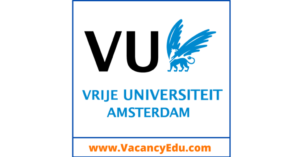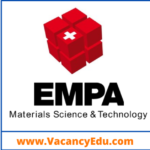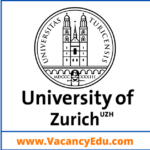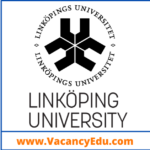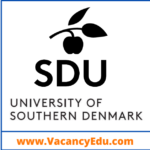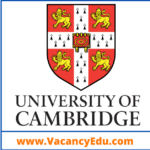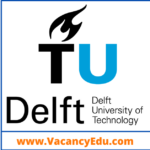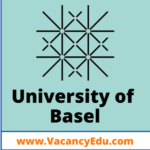Vrije University Amsterdam, Netherlands invites online Application for various Postdoctoral Fellowship in their different Departments. We are providing a list of Postdoc Fellowship positions available at Vrije University Amsterdam, Netherlands.
Eligible candidate may Apply as soon as possible.
(01) Postdoctoral Fellowship Position
Postdoc Fellowship Position summary/title: Postdoc on Ethnography of Robots at work
Despite robots increasingly entering our work lives, we know surprisingly little about their impact on jobs. Engineers are excited to build intelligent robotic applications with the aim to alleviate difficult, risky, or boring jobs, such as cleaning, bomb diffusion, transportation of goods or surveillance. Labor economists and public commentators, in turn, put forward gloomy scenarios of jobs becoming obsolete, degraded or void of meaning. Currently, however, we lack a rigorous insight into how robots are really used in situated work practice. Without such insight, engineers are in the dark about what impact robots have on work and have few methods of including work context into account when building robotic applications. This NWO-funded Vidi project aims to generate such insight by conducting several ethnographic studies of professional service robots at work.
In this context, we are looking for a candidate to fill one Postdoc position for a duration of two years. Starting date is flexible throughout 2024 and will be agreed on with the suitable candidate.
Deadline : Open Until Filled
(02) Postdoctoral Fellowship Position
Postdoc summary/title: Post Doc: Statistical physics of chromosomes
Our theory group is a worldwide leader in studying the statistical physics of living systems, ranging from chromosomes to migrating cells and multicellular tissues. We aim to understand the emergent functional dynamics and organization of living systems in close collaboration with various experimental labs. We currently have an opening for an ERC funded 3-year Post Doc position.
We are looking for highly motivated applicants with a PhD to strengthen our research team in an interactive and
collaborative environment.
Deadline : 30-6-2024
Looking for more Postdoctoral Positions Click Here
(03) Postdoctoral Fellowship Position
Postdoc Fellowship Position summary/title: Postdoc position on Micro- and nanoplastics analysis in human samples
The vacancy is embedded in the section Chemistry for Environment and Health of the Amsterdam Institute for Life and Environment (A-LIFE) in the Faculty of Science of the Vrije Universiteit Amsterdam. A-LIFE brings together the former departments of Environment & Health, Molecular Cell Biology and Ecological Sciences. A-LIFE seeks to connect properties and emerging behaviours across all scales, from molecules to ecosystems, including human populations. The section Chemistry for Environment and Health, headed by prof. dr. Marja Lamoree, investigates environmental and human exposure, focusing on the development and application of advanced analytical methods for accurate, robust exposure of the assessment to a wide variety of chemicals, and including micro- and nanoplastics.
Deadline : Open Until Filled
(04) Postdoctoral Fellowship Position
Postdoc Fellowship Position summary/title: Postdoc position in the field of single-molecule biophysics
Deadline : 27-5-2024
(05) Postdoctoral Fellowship Position
Postdoc Fellowship Position summary/title: Postdoc researcher in NWO research project ‘The Holocaust in the Provinces’
The NWO-funded project The Holocaust in “the Provinces”: Local Dynamics in the Nazi-Occupied Netherlands (1925 – 1950) was launched in January 2023 under the leadership of dr. Geraldien von Frijtag Drabbe Künzel and prof.dr. Ido de Haan (Utrecht University, Department of History and Art History) and dr. Dienke Hondius (VU Amsterdam, History). With two PhD students the team has started investigating how the Dutch local community´s specific political and social structures and cultural customs impacted the persecution of the Jews in the Second World War, and, vice versa, how the persecution affected these structures and customs. In order to understand the genocidal process at a communal level, and its specific structures and customs, the project covers the period from the years leading up to the genocide, as well as its immediate aftermath (1925-1950). For more details, see https://localholocaust.nl.
For the next years of the project, we are seeking a post-doc to develop a synthetic account of communal aspects of the Holocaust in the Dutch provinces. In terms of geographical scope, the perspective switches here from the local to the intercommunal scope, and to dimensions of persecution of possibilities of evasion and escape between local communities. A key-question is to what extent escape routes were paved by pre-existing intercommunal personal ties and networks. A crucial aspect of this position in the project is to digitally process larger sets of data and to visualize local dynamics and intercommunal exchanges in a digital atlas of the persecution of Jews in the Dutch provinces. For more details on the Postdoc research, see https://localholocaust.nl/subproject-3-intercommunal-intersections-in-jewish-trajectories-of-evasion-and-escape
Deadline : 24-3-2024
Click here for “Postdoc Application Cover Letter Template”
Click here to know “How to write a Postdoc Job Application or Email”
(06) Postdoctoral Fellowship Position
Postdoc Fellowship Position summary/title: PostDoc Experimental evolution
In food, biotechnology and pharmaceutical applications various organisms are used to produce metabolites, proteins or biomass. The organisms used for it are carefully chosen and many strains have been developed by decades of strain improvement. Such improvements are often based on so called laboratory or experimental evolution. In addition to the applied aspect of such evolved strains, their characterization has allowed to unravel many fundamental biological questions on the evolution, physiology and genetics of various organisms.
We have recently developed a technology for experimental evolution that differs from existing systems. Within this project the method will be improved and automated, and a diverse set of organisms will be evolved and characterized in depth. This includes the evolution of food and pharma related microorganisms and eukaryotic cells, including microbial communities and host-phage co-evolution.
Deadline : 29-3-2024
(07) Postdoctoral Fellowship Position
Postdoc Fellowship Position summary/title: Postdoc in machine learning and reinforcement learning
The project aims at pushing the boundaries of machine learning and reinforcement learning with applications to healthcare data. This project will develop state-of-the-art machine learning architectures tailored for temporal data. The goal will be to improve existing techniques such as off-policy evaluations in the context of reinforcement learning with both fundamental and applied contributions.
The application on epidemiological data will apply these innovative methodologies to refine our understanding of how environmental factors interact with intrinsic capacity, ultimately shaping functional outcomes in older adults.
Deadline : 15-4-2024
(08) Postdoctoral Fellowship Position
Postdoc Fellowship Position summary/title: Postdoc onderzoeker DigAble ‘Media-interventions and neurodivergent youth’
While recognition and respect for neurodiversity are growing, the impact of large societal shifts, such as digitalization, is felt disproportionally by a broad group of neurodivergent youth (including borderline to mild intellectual disability-MID, autism and ADHD). Media-lessons and -interventions for the general youth population have been developed but it remains unclear what interventions are suitable for neurodivergent youth. In this project, DigAble, the overarching goal is therefore to investigate how neurodivergent youth may become more resilient and less vulnerable in the online world in order to lower digital inequity. We want a better understanding of needs, suitable tools, and appropriate policies, in particular for neurodivergent youth and their caregivers. DigAble answers to the call that seven government ministries posed for insight into the effects of digitalization, with funding through the Nationale WetenschapsAgenda (NWA).
In DigAble we will 1) describe the needs and capacities of neurodivergent youth, their parents, educators, carers, and managers in this sector and how these should be matched with support, 2) gain insight into practice elements of media interventions for evidence on differential effects and 3) integrate findings from aim 1 and 2 to co-create an optimal decision-making framework for youth, their families, schools and care organizations, and professionals.
Deadline :31-3-2024
Click here to know “How to Write an Effective Cover Letter”
(09) Postdoctoral Fellowship Position
Postdoc Fellowship Position summary/title: Postdoc position: The Geopolitical Drivers of Europe-China Tech Decoupling
This postdoc position is part of the Vidi project “Globalization Unravelling? The Geopolitics of Europe-China Tech Decoupling” funded by NWO (the Nederlandse Organisatie voor Wetenschappelijk Onderzoek). In this project, we analyse and explain the geopolitical drivers behind emergent decoupling between Europe and China in the realm of technology. The project has three ‘workstreams’ to which you will contribute. In the project we place contemporary geopolitical competition over technology in a wider historical context by analysing ‘three waves of techno-nationalism’ going back to the Cold War as well as the competition with Japan in the 1980s (WS1). Against this background we will analyse how political and geopolitical drivers are shaping policies, practices and contestation around contemporary technological decoupling between Europe and China and explain (variation in) technological decoupling practices and responses in Europe and across different tech domains (WPS2). In addition, the project develops novel theorisation around technonationalism and the emergent topic of decoupling and recoupling in a globalized world (WS3).
You will be part of a team consisting of the Principal Investigator (PI), a PhD, and a research assistant.
Deadline : 22-4-2024
Connect with Us for Latest Job updates
(10) Postdoctoral Fellowship Position
Postdoc Fellowship Position summary/title: Postdoc researcher DigAble ‘Media-interventions and neurodivergent youth’ needs’
While recognition and respect for neurodiversity are growing, the impact of large societal shifts, such as digitalization, is felt disproportionally by a broad group of neurodivergent youth (including borderline to mild intellectual disability-MID, autism and ADHD). Media-lessons and -interventions for the general youth population have been developed but it remains unclear how suitable interventions are for neurodivergent youth. In this project, DigAble, the overarching goal is therefore to investigate how neurodivergent youth may become more resilient and less vulnerable in the online world in order to lower digital inequity. We want a better understanding of needs, suitable tools, and appropriate policies, in particular for neurodivergent youth and their caregivers. DigAble answers to the call that seven government ministries posed for insight into the effects of digitalization, with funding through the Nationale WetenschapsAgenda (NWA).
In DigAble we will 1) describe the needs and capacities of neurodivergent youth, their parents, educators, carers, and managers in this sector and how these should be matched with support, 2) gain insight into practice elements of media interventions for evidence on differential effects and 3) integrate findings from aim 1 and 2 to co-create an optimal decision-making framework for youth, their families, schools and care organizations, and professionals.
Deadline : 31-3-2024
About The Vrije University Amsterdam, Netherlands –Official Website
The Vrije Universiteit Amsterdam is a public research university in Amsterdam, Netherlands, founded in 1880, and consistently ranks among the top 150 universities in the world by major ranking tables. The VU is one of two large, publicly funded research universities in the city, the other being the University of Amsterdam (UvA). The literal translation of the Dutch name Vrije Universiteit is “Free University”. “Free” refers to independence of the university from both the State and the Dutch Reformed Church. Both within and outside the university, the institution is commonly referred to as “the VU”. Although founded as a private institution, the VU has received government funding on a parity basis with public universities since 1970. The university is located on a compact urban campus in the southern Buitenveldert neighbourhood of Amsterdam and adjacent to the modern Zuidas business district.
In 2014, the VU had 23,656 registered students, most of whom were full-time students. That year, the university had 2,263 faculty members and researchers, and 1,410 administrative, clerical and technical employees, based on FTE units. The university’s annual endowment for 2014 was circa €480 million. About three quarters of this endowment is government funding; the remainder is made up of tuition fees, research grants, and private funding.
The official university seal is entitled The Virgin in the Garden. Personally chosen by Abraham Kuyper, the Reformed-Protestant leader and founder of the university, it depicts a virgin living in freedom in a garden while pointing towards God, referring to the Protestant Reformation in the Netherlands in the 16th and 17th century. In 1990, the university adopted the mythical griffin as its common emblem.
Disclaimer: We try to ensure that the information we post on VacancyEdu.com is accurate. However, despite our best efforts, some of the content may contain errors. You can trust us, but please conduct your own checks too.
Related Posts
- Postdoctoral Fellowship (03) at EMPA, Zurich, Switzerland

- Postdoctoral Fellowship (14) at University of Zurich, Switzerland

- Postdoctoral Fellowship (04) at Maastricht University, Netherlands

- Postdoctoral Fellowship (09) at Groningen, Netherlands

- Postdoctoral Fellowship (05) at Linkoping University, Sweden

- Postdoctoral Fellowship (17) at University of Southern Denmark, Denmark

- Postdoctoral Fellowship (28) at University of Cambridge, United Kingdom

- Postdoctoral Fellowship (13) at Delft University of Technology (TU Delft), Netherlands

- Postdoctoral Fellowship (09) at University of Basel, Switzerland


